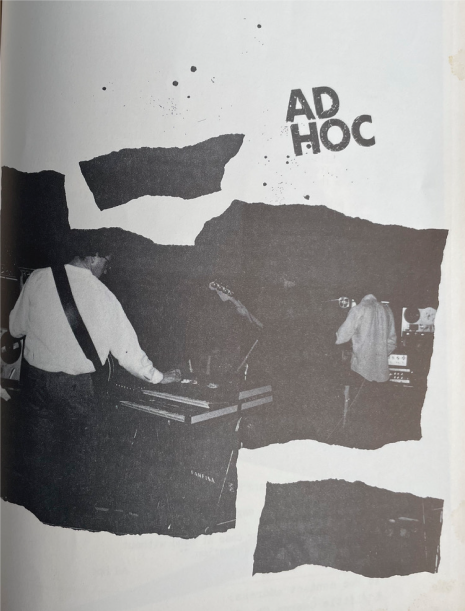Ad Hoc “Corpse” (sham125)

Shame File Music and Albert’s Basement follow up the critically-acclaimed 2022 reissue of seminal Melbourne band Ad Hoc’s Distance cassette with the band’s obscure barely-released (perhaps six home-dubbed copies) live cassette Corpse – available digitally and on a limited edition of 100 cassettes from September 2023 (pre-order now).
Differing dramatically from Distance, Corpse captures the trio presenting a wall of almost self-playing instruments live to a bemused Clifton Hill Community Music Centre audience in 1980. As James Clayden explains below, the sounds were already set up before the audience entered, then the amps were simply turned on. The performers present perhaps as a corpse; unmoving, yet with a dramatic visceral impact:
The Corpse performance at the Clifton Hill Community Music Centre (CHCMC) came out of recording sessions we had been having at an empty enclosed car park in the backstreets of Carlton and in Chris’s piano/music room in Fitzroy. We’d been experimenting with each of us getting our own specific sound/noise set up then seeing how we could manipulate these into one piece of music/sound, or noise whichever you prefer, that felt right.
All recordings were made using a stereo binaural/dummy-head microphone set up as the “audience/listener”.
After several sessions of this we figured we were ready to play/perform at CHCMC, deciding to set the sounds up before any audience arrived, turn off the amps with everything set and once people were seated we’d count to 4 turn amps on and take it from there, after 15 minutes or so we’d turn the amps off to end the piece. Doing the same sort of thing after a short interval, the sound to start would be different from the first piece as we’d start where we’d stopped, then ending the second piece in the same way as the first piece.
James Clayden, 2023.

Ad Hoc’s performance was reviewed in New Music #1 (1980) by Paul Schutz (of the Laughing Hands):
This was Ad Hoc’s 2nd performance at CHCMC and the first I had seen. Unfortunately there were few people there on the night and the emptiness of the building combined with the music gave the place a rather desolate atmosphere – which was not necessarily undesirable. Ad Hoc did not communicate verbally with us (the audience) and two of their rank had their backs to us constantly, this increased the vacuous intimacy all the more as did the appearance of the playing space which was no longer the intimate “In the comfort of you lounge” backdrop which ad been there for the previous few weeks, but a start black box with two spotlights which pointed accusingly at the audience.
All the sounds used in the performance were electronic coming either from guitars (treated), organ-synthesiser or tapes. The pieces seemed to have been worked out beforehand and to have predetermined length etc. They varied from extremely dense buildups of complex machine-like sounds which emphasized slight changes in timbre and tone colour, mainly because of a lack of silence dynamic variation. The listener confronted with an even wall of sound will take foothold in the slightest variation from which to observe the rest of the piece – to move “subtle” melodic items which used to recall capacity of the AKS as a base structure for the organ and guitar. Personally, I found the more dense and oppressive pieces considerably more interesting as skilful manipulations of sound, particularly when played against the “safer” more predictable structures offered the third and last pieces. One thing I enjoyed a lot was the way in which a mass of one particular tone and volume would be set up and allowed time to engrave itself upon the frontal lobes and then another quite different sound would happen creating the illusion of coming from behind or above the listening area until the ears adjusted to its novelty.
I thought at one point that a piece of corrugated iron was dragging across the gravel outside and the sound was coming in the back wall.
One piece in the middle of the evening was obviously plagued with technical problems, but I got the feeling that this was unusual; the use of tapes for example was carried off with no apparent problems which is quite and achievement.
A good evening of interesting work of the type which is not offend heard in the provinces of “serious” new music and cheap technological experimentation.
The practice of New Music was to give performers a right of reply to the review, however Schutz writes that, “Ad Hoc were quite reticent to discuss their music or the performance in question…they offered the brief reply printed below:”
Not spotlights: two bare bulbs to see with.
No accusation
No pre-recorded tapes: magnetic tape for delays/loops.
For the particular end or case at hand without consideration or wider application.